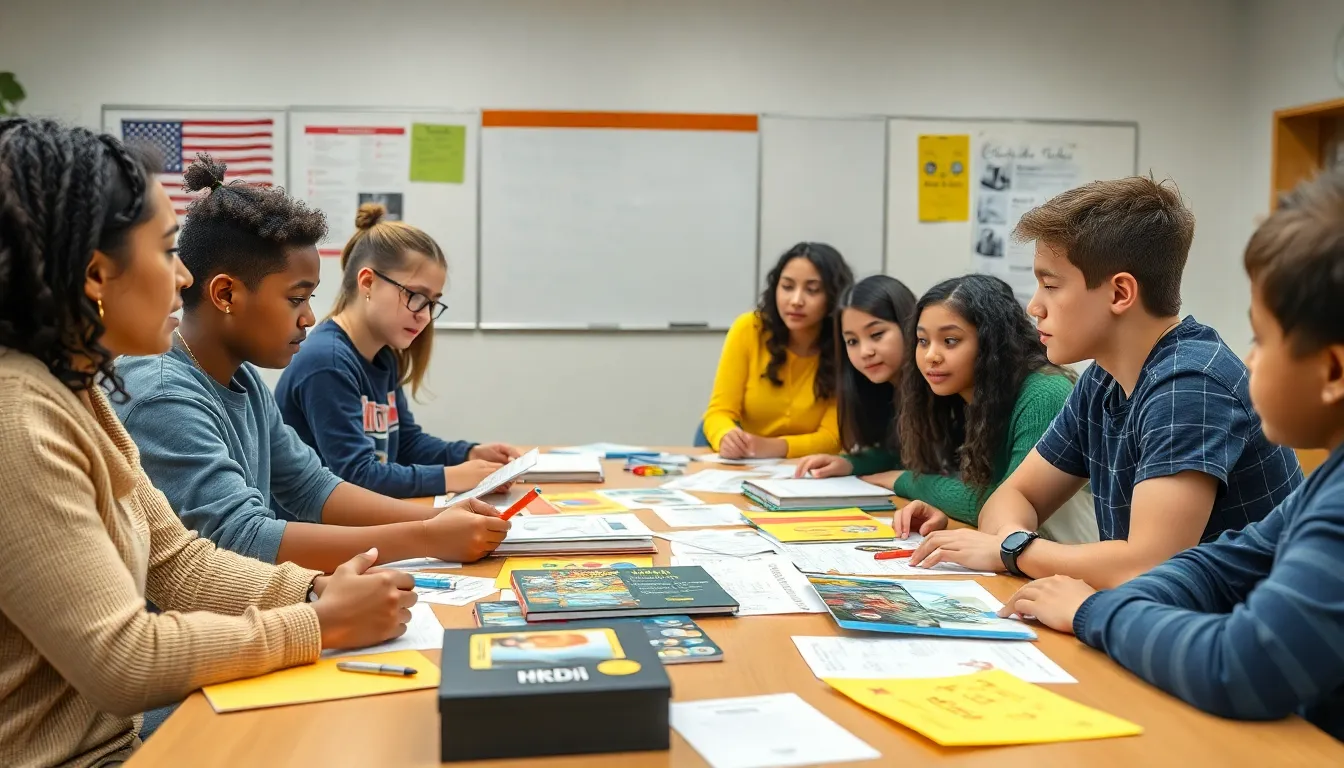Table of Contents
ToggleNavigating the world of higher education can feel like trying to find a unicorn in a haystack, especially for those interested in special education college programs. These programs aren’t just about textbooks and lectures; they’re gateways to transforming lives and making a real difference. Imagine diving into a field where compassion meets strategy, and every lesson learned could help someone unlock their potential.
Special education isn’t just a career; it’s a calling. With the right program, students can gain the skills needed to advocate for diverse learners, making classrooms more inclusive and supportive. So, if you’re ready to swap the mundane for the meaningful, buckle up! Special education college programs might just be the adventure you didn’t know you were looking for.
Overview of Special Education College Programs
Special education college programs offer specialized training to prepare educators for diverse classroom environments. Coursework typically includes subjects like psychology, pedagogy, and specific instructional strategies. Students engage in practical experiences, such as internships or student teaching, which enhance their skills.
Programs also emphasize understanding various disabilities, including learning disabilities and emotional disturbances. Such knowledge enables future educators to create inclusive learning experiences. Accreditation is crucial; many programs require national or regional accreditation from recognized bodies.
Graduates often pursue licensure, permitting them to teach in public schools. Some programs also provide opportunities for students to engage in research. Many institutions offer advanced degrees, such as master’s programs, focusing on specialized areas within special education.
Support services, like mentoring and counseling, are often included to help students succeed academically. Networking opportunities with professionals in the field occur through workshops and conferences. This engagement fosters connections that are beneficial when entering the job market.
Numerous institutions tailor programs to meet the needs of adult learners. Flexibility exists in online courses, enabling students to balance work and study. Scholarships specific to special education students are available, reducing financial barriers.
Ultimately, special education college programs play a vital role in equipping teachers to foster positive educational experiences. Highly trained educators not only advocate for students but also build supportive and inclusive classrooms. Investing in this field enhances the educational landscape for all learners.
Types of Special Education College Programs

Special education college programs encompass a variety of academic paths aimed at equipping future educators with the necessary skills. Each type caters to different levels of expertise and experiences in the field.
Undergraduate Programs
Undergraduate programs serve as foundational courses for those entering the special education field. These programs typically include a Bachelor of Arts or Bachelor of Science degrees focused on special education or related fields. Students engage in coursework covering psychology, teaching methods, and developmental milestones for children with disabilities. Field experiences in classrooms offer real-world applications of learned strategies. Graduates often pursue teaching licenses, making them eligible to work in public schools.
Graduate Programs
Graduate programs build on undergraduate knowledge, delving deeper into specialized areas of special education. Master’s degrees provide advanced studies in topics such as behavioral intervention and inclusive education practices. Candidates often conduct research and complete internships in diverse educational settings. Some programs offer certificates focused on particular disabilities, such as autism spectrum disorder or learning disabilities. Graduates frequently move into leadership roles or specialized teaching positions, further advocating for inclusive practices.
Admission Requirements for Special Education College Programs
Admission to special education college programs typically involves fulfilling specific prerequisites and completing an application process. Understanding these steps ensures prospective students are well-prepared.
Common Prerequisites
Common prerequisites for these programs often include a high school diploma or equivalent. Many institutions also require specific college coursework in areas such as psychology or education. Some programs might ask for a minimum GPA, generally around 2.5 to 3.0, to demonstrate academic readiness. Additionally, prospective students may need to submit standardized test scores, including the SAT or ACT, depending on the institution’s requirements.
Application Process
An application process usually begins with submitting an application form through the institution’s website. Students often need to provide academic transcripts from previous schools to showcase their educational background. Letters of recommendation can bolster an application, typically from educators or professionals familiar with the applicant’s commitment to special education. An interview may also be part of the acceptance criteria, allowing admissions teams to assess candidates’ passion and suitability for working with diverse learners.
Curriculum and Course Structure
Special education college programs feature a structured curriculum designed to equip future educators with necessary skills. This curriculum emphasizes both theoretical knowledge and hands-on experience, preparing graduates for diverse classroom environments.
Core Courses
Core courses form the backbone of special education programs. These classes typically include subjects like psychology, pedagogy, and education strategies. Specific courses focus on understanding disabilities, classroom management, and assessment techniques. Practical experiences are integrated into core coursework, allowing students to apply their learning in real-world scenarios. Internships often occur in various educational settings, giving students invaluable insight into the challenges and rewards of teaching students with special needs.
Elective Courses
Elective courses provide students with the opportunity to explore specialized interests. These courses can encompass topics like assistive technology, behavior management, or family dynamics in education. Some institutions allow students to select electives that align with their career goals, such as teaching in inclusive classrooms or working with specific disabilities. This flexibility helps tailor the educational experience to individual career paths, enhancing overall engagement and expertise in specialized areas. Electives further support career readiness by fostering diverse skill sets essential for effective teaching.
Career Opportunities After Graduation
Graduates from special education college programs enter a variety of fulfilling career paths. Positions often include roles such as special education teacher, instructional coordinator, and school psychologist.
Job Prospects
Job prospects for graduates remain strong due to a growing demand for special education professionals. As reported by the Bureau of Labor Statistics, special education teachers can expect job growth of 3 percent through 2031. Increased awareness about inclusivity in education drives this demand. Many districts seek educators equipped with specialized training, including methods for accommodating various disabilities. Graduates who display adaptability and innovation can find opportunities in public and private schools as well as community organizations.
Further Education Options
Many graduates opt for further education to enhance their expertise and career potential. Advanced degrees such as master’s or doctoral programs in special education allow for deeper specialization in areas like behavioral analysis or educational leadership. Certification options also exist for graduates wishing to pursue roles in school counseling or administrative positions. Continuing education courses and workshops provide additional skills and knowledge, keeping educators current with evolving practices and policies in special education. Each pathway enriches their capabilities, broadening career opportunities in diverse educational settings.
Special education college programs serve as a vital pathway for those committed to making a difference in the lives of students with diverse needs. These programs not only equip future educators with essential skills but also cultivate a deep understanding of inclusivity and advocacy. Graduates emerge ready to tackle the challenges of today’s classrooms and to inspire positive change.
With a growing demand for qualified professionals in this field, the opportunities for impactful careers are abundant. As they embark on this fulfilling journey, prospective students can look forward to a rewarding experience that goes beyond traditional teaching, ultimately shaping a more inclusive educational landscape for all learners.




